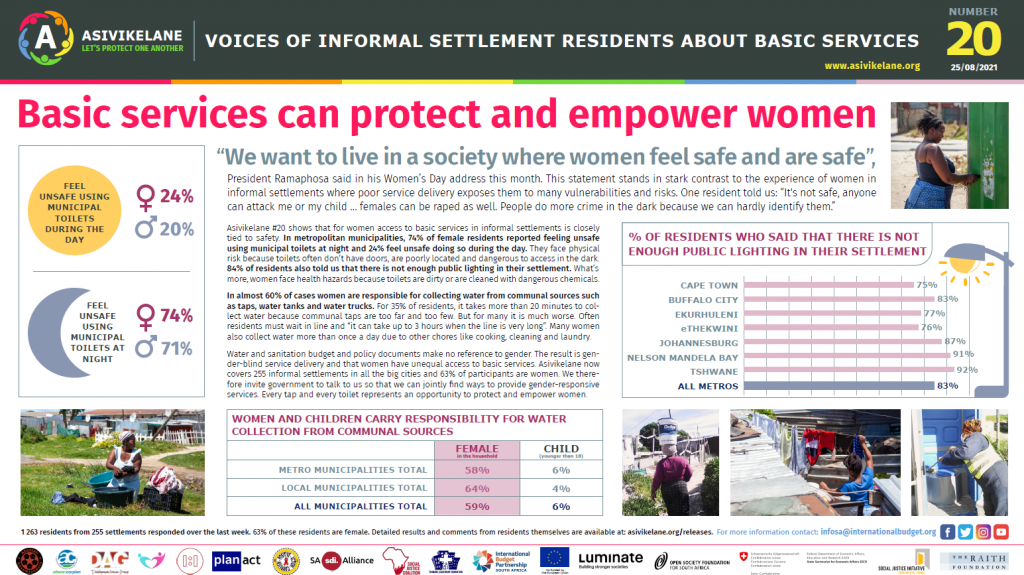Prepared by Dr Hloniphile Simelane[1]
A new platform for advocacy on gender equality
Planact has joined the Women and Habitat Africa Working Group (WHAWG), which links up Habitat International Coalition (HIC) with many member organizations in Africa and with projects of HIC-HLRN on Women’s Land and Housing Rights. The WHAWG’s concept note (2021) stipulates that the aim of this group is to jointly address challenges facing women and girls in their habitat and advocate equal realization of their habitat-related human rights. These rights include the human rights to adequate housing, land, food, water and sanitation. Critical is advocating women’s equal access to, use, and control of natural and economic resources through an equitable inheritance, legally secure tenure—to ownership—of land, housing and other property. Multi-level advocacy and feminist approaches will be at the core of these advocacy initiatives.
Planact’s Programme, Strengthened Grassroots Voices, catalyses inclusivity of marginalised groups in local government. Thus, it resonates with the mandate of the Women and Habitat Africa working Group, which highlights the importance of women’s voices to be heard, and be given space in decision-making fora. This calls for a strategy to improve the capabilities of all categories of women. Importantly, it is in tandem with the Un HABITAT New Urban Agenda (https://habitat3.org/the-new-urban-agenda/) which points out the imperative for gender equality and the empowerment of all women and girls.
Planact therefore has reconfigured its approach to gender issues, and intensified its feminist perspective to strengthen advocacy and lobbying efforts. The focus on land and housing issues affecting women and girls is crucial given the prevalence of challenges of women regarding access to land use, inheritance and control of land and private property in Sub-Saharan Africa.
The relevance of the Working Group to gender equality
The challenges women face continue despite the fact that a majority of African countries including South Africa, have developed progressive laws as response to the global call for gender equality. However, the policies are poorly implemented and as such; women suffer the brunt of the exclusionary institutional practices, which are sometimes associated with gender-based violence.
A study by researchers Debbie Budlender and Eileen Alma (Women and Land: Securing Rights for Better Lives) demonstrates that passing legislation is of little effect without the necessary resources for implementation (available at https://idl-bnc-idrc.dspacedirect.org/handle/10625/47431). It also underscores the role of educating all relevant actors on the provisions of the legislation and effective sanctions on failure to implement. Their findings suggest the critical role that non-governmental organisation should play in advocating and educating women from vulnerable communities about their land and housing rights. Other publications advocating the need to raise awareness on the same issue includePlanact’s recent article entitled ‘women-are-entitled-to-own-land’ available at https://mg.co.za/opinion/2020-10-18-women-are-entitled-to-own-land/.
This mandate cannot be overemphasised given that researchers such as Professors Cheryl Doss and Ruth Meinzen-Dick in ; in their study ‘ Land tenure security for women: A conceptual framework’ highlight that access to land, housing and tenure security for women is fundamental for the realization of their human rights and empowerment. In fact, it is a prerequisite for building secure and resilient communities. It offers women a way out of insecurity, poverty, and serves as the foundation on which women can support themselves and their families.
A call for collaboration with other organisations
Our observation therefore is that joining the Women and Habitat Africa Working Group is a necessity that warrants attention from the organisations involved in land and housing issues. Indeed, the collaboration with various organisations offers an opportunity to advocate for systemic change at a regional level.
The Women and Habitat Africa Working Group, and the member organisations, have an excellent opportunity to leverage the skills and resources of the member organisations, meanwhile providing the opportunity for an in-depth understanding of the phenomenon. For this reason, Planact encourages other non-governmental organisations to consider joining the group in order to strengthen the numbers and voices necessary to shift not only national systems or processes/practices but also those of regional and global bodies such as the African Union and the United Nations.
Notably, organisations interested in being members of the Women and Habitat Africa Working Group are expected to join Habitat International Coalition (HIC). Further information on the Working Group is available on: https://www.hic-net.org/africa-region-forms-a-women-and-habitat-africa-working-group/. The contact person for the Working Group is Mr. Samuel Ikua, who also serves as the secretary, and can be reached by email at: samuelikua@gmail.com and over the phone on +254726 690 832.samuelikua@gmail.com
[1] I acknowledge the comments received from Mr. Samuel Ilua, the Secretary of the Women and Habitat Africa Working Group. The information he provided has been valuable.

